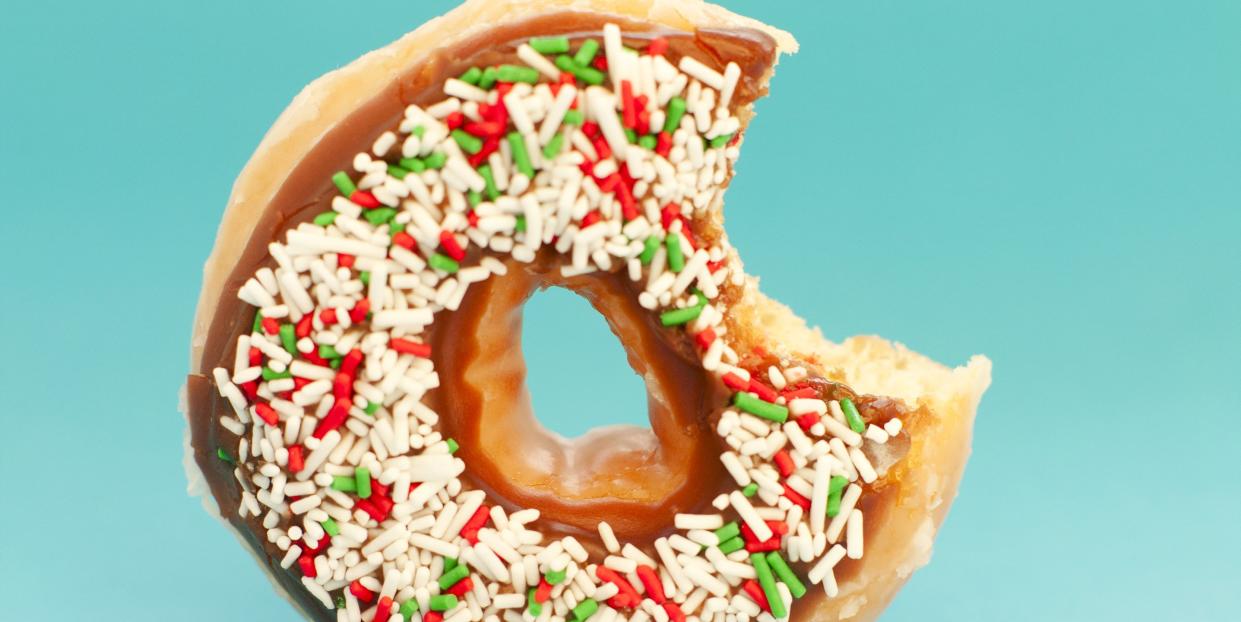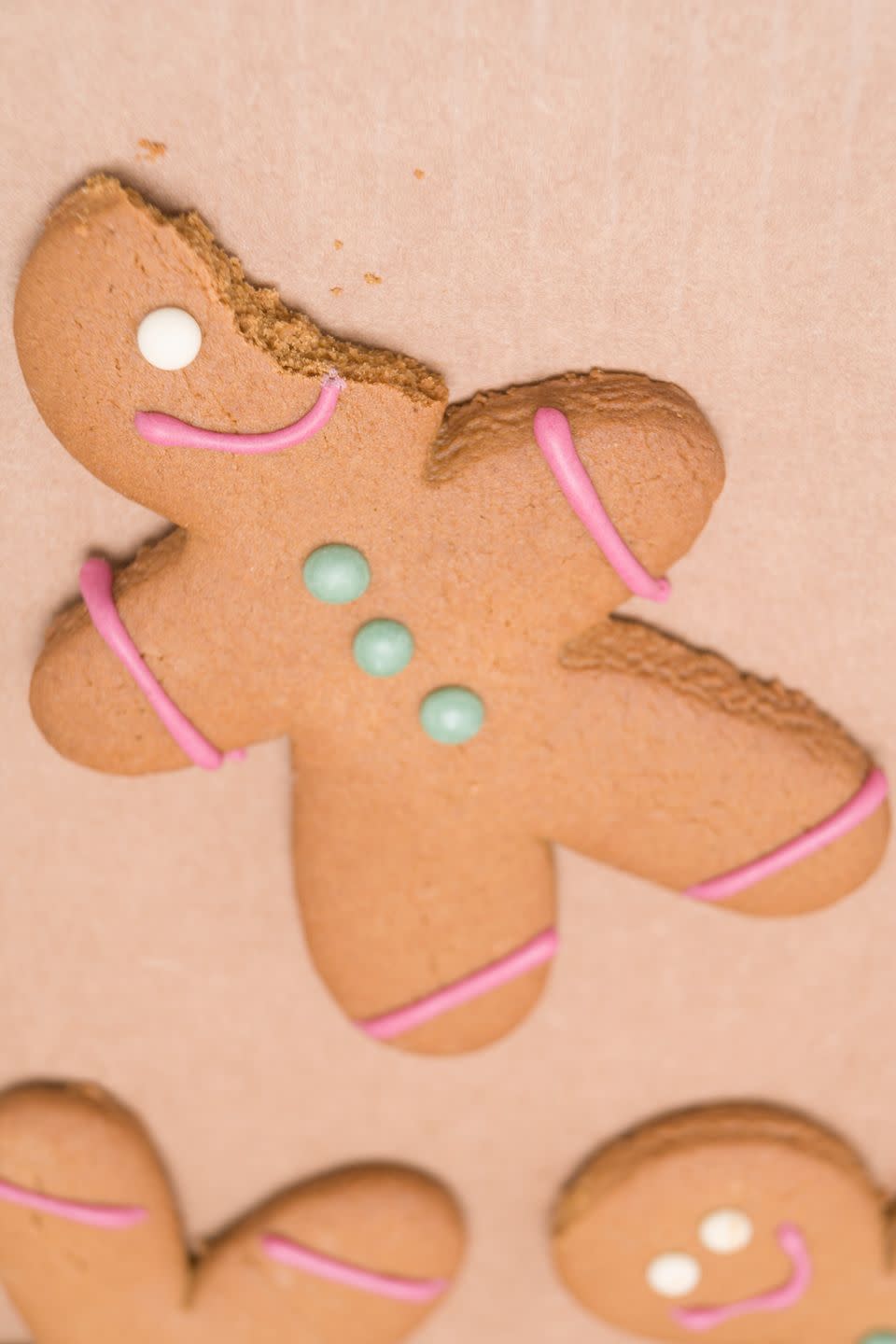5 Reasons to Not Stress About Holiday Weight Gain

For decades, the conventional wisdom has been that most people gain around five pounds between that first forkful of Thanksgiving stuffing to the greasy egg breakfast on New Year’s Day.
Well, good news is that the five-pound pile-on is, like a lot of what you hear about holiday weight gain, overblown. Check out these holiday weight gain facts that will take your mind off the pounds and put it on enjoying time with your friends and family.
If you gain weight over the holidays, it’ll probably just be a pound or two.
The New England Journal of Medicine published a study of adults showing that the average holiday weight gain was .37 kilograms, or just under a pound, and more than half the people in the study stayed within a kilogram, or just over two pounds, of their other weigh-ins.
“If you start to push the envelope at Thanksgiving and proceed to green-light every Christmas cookie and cocktail, you could put on five,” says Lauren Slayton, MS, RD, a New York City dietician and founder of Foodtrainers. “But I think all the holiday weight gain hysteria has made most people aware enough to be reasonable.”
Even if the scale says you put on five pounds, you probably haven’t.
“What I notice is that over the course of those weeks, people are eating out more at dinner parties and events and drinking more alcohol — and are sleeping less, which typically contributes to weight gain,” says Brigitte Zeitlin, MPH, RD, owner of BZ Nutrition in New York City. “But a lot of what the scale reads is more water weight than fat gain.” Eating more starchy foods (hello, sweets and dinner rolls!) and more salt than usual leads to water retention and bloat.
So you may heel heavier, but by going back to your normal healthy eating (lots of water-filled veggies and fruits, drinking lots of water, and judicious choices that don’t involve crumbled candy canes sprinkled on top) that water weight will go away again.
You’re highly unlikely to break even by exercising more during the holidays.
“This type of food/exercise math is always faulty,” says Slayton, who is 100% pro-exercise for its much-needed mood-boosting benefits (plus it can be an escape from a too much family togetherness.) “But it does not ‘cancel out’ the stuffing and nog.”
Science and Zeitlin agree. “Weight loss is around 80% what you put into your body and 20% what you sweat off,” she says.
There’s also the risk that thinking of that you “deserve” another wedge of pecan pie (502 calories) because you power walked that morning (around 180 calories burned in a half hour). “We all know how that story ends,” says Slayton.

You’re also unlikely “make up for” overdoing it quickly, even if you diet in January.
“If you were boozing and sugaring it up, you might not have an easy time going cold turkey. Sweet begets sweet — once you start mainlining it, you want it and a salad no longer looks good. And these festive foods can affect your microbiome. Even when you start to eat better, there can be a lag based on the effects all that fun had on your body," Slayton says.
Far better to just be chill in the first place. Zeitlin advises picking one treat per event — i.e., at this party you’ll drink, and at the next event, you can have dessert. “Your indulgences are part of your healthy living — when they are planned, looked forward to, and savored,” she says. This is true all year long, not just at the end of the year, she adds.
Slayton likes the “1 of 4” rule: Of bread, booze, “dinner carbs” like rice or potatoes, and dessert, at any meal, you pick just one. “Or two if you must, but skip the others,” she says.
Eating a breakfast with filling protein, drinking lots of water, eating veggies, and lean proteins (as you would any time of year) and not showing up to food-centric events ready to gnaw your own arm off will also help you avoid holiday pounds.
That gingerbread dude is not — repeat, not — the last cookie you will ever eat.
Kind of like an end-of-year clearance sale, you see the groaning buffet and feel like if you don’t snarf that cookie/cake/candy/roll/whatever right then, you’ll never get another opportunity.
I mean, sure, there’s a teeny tiny chance that you’ll get run over by a reindeer as soon as you leave the party, but odds are excellent that you’ll live to eat another day.
This comes back to planning to have a treat, and being less all-or-nothing in your thinking, says Zeitlin. “If you go into the evening knowing you’ve planned for 3-4 cookies, then you will savor each one a bit more and not feel the immediate boomerang effect of ‘can’t have any’ to ‘having them all,’” she says. “The more restrictive you are, the more likely you are to binge.”
And if you do have a few too many whatevers? “Relax, take a deep breath, and tell yourself that the next meal is back to your regularly scheduled program,” says Zeitlin. “The spiraling comes from shame and guilt — hard pass.”
You Might Also Like

